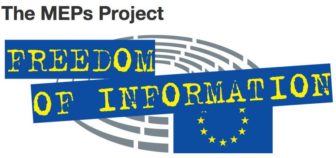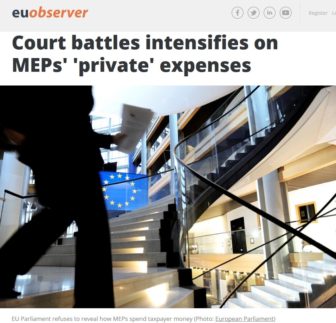

Q&A with the Muckraker Extraordinaire Who Made the Politico 28
Anuška Delić is not someone who goes unnoticed. Opinionated, brazen and bold, her tenacity and relentlessness has made her the foremost investigative reporter in Slovenia and among the most influential in Europe. This week, she’s made the Politico 28 Class of 2018, “the list of doers, disrupters and dreamers who will transform European life, politics and ideas,” selected by the publication Politico.
And disrupt, she does.
Delić, an investigative and data journalist at Delo, is a network partner of the Organized Crime and Corruption Reporting Project (OCCRP) and a member of the International Consortium of Investigative Journalists. She has worked on a number of significant cross-border reporting projects, such as the Paradise Papers, the Panama Papers and The Azerbaijani Laundromat.
More importantly, she launched, managed and coordinated The MEPs Project, a cross-border reporting project that was unprecedented in scope, challenging Members of European Parliament (MEPs) for greater transparency, and ultimately challenging the Parliament itself at the European Court of Justice.
Here she discusses the project, how it began, what it led to and what she’s learned from it so far.
How did you get the idea for The MEPs Project?
It started with a conversation about the European Parliament with my colleague Nils Mulvad from Denmark after I had requested data from Parliament exclusively for Slovenian MEPs. I was turned down. I was really upset because the Freedom of Information Act in Slovenia explicitly states that information pertaining to the spending of public money or exercise of public duty, which I was requesting, is public information and, in theory, I would be able to get this information more or less quickly.
 In my conversation with Nils, a lightbulb went off and I said, “Oh, wow, maybe I should just get journalists from all EU member states to file the same request and put pressure on the European Parliament.” Not only that, it would be a symbolic push with journalists across Europe demanding the same thing. This is how the project started.
In my conversation with Nils, a lightbulb went off and I said, “Oh, wow, maybe I should just get journalists from all EU member states to file the same request and put pressure on the European Parliament.” Not only that, it would be a symbolic push with journalists across Europe demanding the same thing. This is how the project started.
What were some findings from the project that surprised you?
The investigation we did this year was on the national offices the MEPs used to conduct their work in their member states. I’m not talking about Brussels or Strasbourg, but their national offices in their home countries. We started this project with the primary question: “How do the MEPs spend the allowance they receive?” That allowance is about EUR 4,342 per month as a lump sum. No questions asked. It’s supposed to be spent specifically, more or less, on their office costs — rent, etc.
So we thought, okay, let’s see who the MEPs pay their rent to. We wanted to find out who the office owners were, at least in countries where we could find this out, as not all countries had open land records.
In the process, we found out that national offices of a third of MEP’s could not be accounted for! That was a huge surprise. We were naive in thinking that if an MEP received 4,000 or so euros every month to finance his or her office costs, we assumed they would have an office. We didn’t think it was possible they wouldn’t have a national office at all.
What were the greatest challenges and obstructions you faced?
There were a few countries where not even one MEP answered the questions put forward by reporters and the reporters tried everything: we called, visited, everything. We had trouble in Poland and in Bulgaria, where not a single MEP answered our questions.
We needed to call them because some of them had no information published about their national office. In Italy, many MEPs didn’t answer at all. In Germany, some MEPs didn’t answer; instead the party chairmen answered on their behalf with blanket statements insisting they were doing everything according to the law.
If had we been asking these questions a few months before European elections, would they have ignored reporters’ questions? Maybe we picked the wrong time.
What are the implications of MEPs refusing to be transparent on how public money is spent?
Our investigations showed that blindly trusting 751 MEPs to follow rules without any oversight is utopian. That will never happen. Why would they spend the allowance on how it was meant to be spent if no one is looking?
EUR 40 million has been spent annually on these allowances without any questions asked for years. We’re talking more than a couple of hundred million euros here. There was one MEP who claimed he was saving this money for a pension. Another who claimed he donated this money to his political party. This is crazy!
This echoes the UK Parliament expenses scandal a few years back, which caused an uproar. Have you seen a similar reaction?
At the national level there was some shock. People were surprised some MEPs didn’t have an office, but there hasn’t been as big of a reaction on the national level as there was for the UK scandal. The Parliament reacted by establishing a working group but it seems so far that it’s not going to implement auditing but only a more specific list of what the allowance can and can’t be used for, but they won’t monitor MEP spending in any way although we’ve shown that this is absolutely necessary. This is public money. I think many things go unnoticed in European institutions because the media and the public are not paying enough attention.
The MEPs Project journalists have taken the European Parliament before the European Court of Justice for refusal to provide access to certain information. Could you explain the background of this?
When the project began in 2015, we filed the Freedom of Information (FOI) requests jointly but we knew we weren’t going to get these documents because a year prior to this project, the Parliament refused to give me access to them for Slovenian MEPs. We knew eventually when the request process was over we would have to decide whether we were going to the European Ombudsman or to the European Court of Justice. The Ombudsman’s decisions are not binding because even if the Ombudsman were to say, “This is public information, you need to give it to the journalists!” the European Parliament can still decline. We knew we had to go to court.
What was the atmosphere like in court?
 Our pro-bono lawyer Nataša Pirc Musar, a lawyer from Nataša’s office, Rosana Lemut Strle, and their assistant Tina Kraigher Mišić and I were present for this hearing. It felt really great to be there. I was extremely proud of the fact that four women were taking on the European Parliament and I was very proud of the work Nataša, Rosana and Tina did for the case. It was three and a half hours but it felt like five intense minutes.
Our pro-bono lawyer Nataša Pirc Musar, a lawyer from Nataša’s office, Rosana Lemut Strle, and their assistant Tina Kraigher Mišić and I were present for this hearing. It felt really great to be there. I was extremely proud of the fact that four women were taking on the European Parliament and I was very proud of the work Nataša, Rosana and Tina did for the case. It was three and a half hours but it felt like five intense minutes.
We don’t yet know when they’re going to rule on the case. What surprised me, though, was that their defense was based on an “excessive burden exemption.” It was only at the court hearing when we were informed that we requested approximately a million documents. The Parliament claimed they only hold about 900,000 documents on paper and that an MEP can have one cupboard full of papers pertaining to their allowance spending and some may have thirty cupboards full.
Whenever a large amount of documents is in question the Parliament should call the journalists requesting the information to negotiate about the types of documents needed for the story and it may well be not all of them are necessary. Due to a lack of transparency we don’t know what documents are valuable to us or not, but the MEPs didn’t call us, and offered us no chance to focus and narrow our requests.
So do they each have their own accounting process?
I’m afraid the internal supervision is weak. The defense was illustrating their difficulties in “cupboards.” The judges asked as to how many cupboards we’re talking about and the defense said it depended on the MEP. So basically, these MEPs are given these allowances, where they need to provide some kind of receipt and they just stick them in a cupboard? They don’t submit them into a system or something? They should have some kind of electronic oversight, but keep everything on paper. I do hope our case will not only lead to a greater transparency but also to a better document management.
Isn’t it their job to answer to their constituencies?
Well, this should always be the case. If it isn’t then we, the journalists, step in. We also heard one more, if I may say, “analogous” argument at the court. The defense claimed that because we are now living in the age of Twitter and Facebook (the MEPs) will be bugged all the time on social media about how they spend their allowance, which is our money.
But as journalists, we have one simple answer to this assertion: The more transparent you are, the less questions will get asked! And when we discuss public money spending, the exemptions should really be limited. In our case we mostly focused on personal data protection as an obstacle to greater transparency. We claim that when performing an MEP function politicians cannot expect as much privacy as “regular” EU citizens.
As a veteran reporter, what advice would you give younger reporters, especially in dealing with FOI requests that are obstructed?
Get a good lawyer! I really encourage journalists to check out European institutions. There’s so much untapped information there that they can work with and it’s not taken advantage of nearly enough.
As far as national requests are concerned, go out there and don’t stop. Any request that we make as journalists, even if we get declined, and then complain and sometimes succeed only half-way and so forth, all of this functions as a way to open up government to the public whether local, national or supranational. FOI requests and complaints, the entire process, is inherently connected to working in the public interest.
Are there any particular databases on this project that you think are underused by journalists?
There’s the database we launched on MEP offices for the public to search, verify or even send us tips to whether an MEP has an office or not. If they have an office, we’ve input information on who owns it, whatever public information we can get about it, and how this MEP voted on transparency of public spending.

Any final thoughts or reflections you’d like to share?
What this project has shown so far and what I keep realizing more and more as we go along is that there’s a huge canyon between the public, that of the European publics, and European institutions which is very detrimental. There’s no bridge between them. Right now the European Union is at a crossroads. European parliamentarians are going to have to try much harder if they want to save the idea of Europe. It’s time to go back to the roots as to why we established the EU, to its founding principles, and I really believe that [opaque] public spending was not among those principles.
People are going to want to leave the Union. We already have Brexit, “Euro-skepticism,” far-right Nazis marching in Poland seventy years after it was liberated from the Nazis, which is horrifying! I don’t see enough pushback from the institutions themselves. I’m worried about where all this is going to end and how fast. We are headed toward European disintegration. The top echelons of Europe will have to step up if we want a new lease on life for the European Union.
 Stella Roque is communications officer for OCCRP and Transparency International’s Global Anti-Corruption Consortium. Prior to joining OCCRP, she was a freelance writer and editor in Paris. She was also a researcher for The Centre for Investigative Journalism in London working with Andrew Jennings on the FIFA corruption investigation.
Stella Roque is communications officer for OCCRP and Transparency International’s Global Anti-Corruption Consortium. Prior to joining OCCRP, she was a freelance writer and editor in Paris. She was also a researcher for The Centre for Investigative Journalism in London working with Andrew Jennings on the FIFA corruption investigation.










